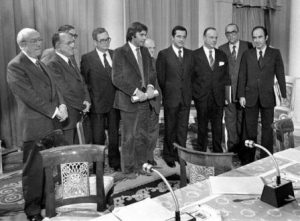An imminent Catalan referendum on independence declared illegal by the Constitutional Court. Here we are, again, hesitating on the brink of domestic chaos, as Barcelona and Madrid are at logger heads, the perennial political hot potato that is Catalan independence.
The British have suffered two divisive and bitter referendum campaigns in recent years, the Brexit campaign and that of Scottish independence. The Scottish nationalist campaign makes a natural parallel with the Catalan question. Such parallels are oblique. The history, constitutional arrangements and approach are very different, but there are key lessons that could be learned from the experience of Scotland. A ballot sold as a «once in a generation» opportunity was narrowly lost by the nationalist campaign. There are bitter recriminations about the «No» campaign style, called «Project Fear» from the losing side, but when under clear pressure to produce fiscal plans and a coherent strategy for separation, the Independence campaign was rejected by the Scots and generated distaste among the population south of the border.
Scots are often stereotyped for not being generous with their money, a Catalan stereotype often cited by the Spaniards. The discussion in both places seems to revolve around finances. Who benefits most from a union, the satellite or the centre. The Catalans argue that they contribute more to the Madrid exchequer than they receive from central funds, just as Scottish nationalists argue that oil profits have sustained British finances. Both London and Madrid contend that a significantly greater amount of per capita funds are directed northward than to less developed regions and that recalcitrant separatists cannot survive alone. The campaign in Scotland was increasingly acrimonious and the rest of the Union viewed the plan as a divorce request whilst still using the joint credit card, the pound sterling. Such was the force of feeling in England, Wales and Northern Ireland, itis now often said that if Scotland were to gain independence, they should ask the Welsh, English and Northern Irishmen to vote on the subject . There seems to be a growing attitude of similar exhaustion among the Spaniards towards Catalonia.
The problem manifested in both Scottish and Catalan nationalist campaigns is twofold. In the first place, such political movements collect support by appealing to the heart rather than to the head. Wave a flag and blame all the defects of society on the oppressive overlord. This brings significant political gains and a strong power base, but requires a constant escalation of emotion and identity to maintain relevance. This is arguably the reason why the paramilitary conflicts of the Basque country and Northern Ireland have moved in a different direction. The reality of corrosive violence and murder brings a stark reality to political barter. It could be argued that without this horrible bloodshed, pragmatism will not overcome the growing demands of identity politics.
The second question, sadly, feeds the former. Such movements built on such an energy of emotion cannot accept defeat. All failed attempts to achieve the goal are resold to the world as steps towards the goal. Admitting that the ultimate goal is unattainable leaves the aspirations of a generation of political operators in tatters. The relentless impulse to ratchet up the emotional investment in the endless voyage generates expectations that are impossible to fulfill.
This leads to an odious conclusion that will have the separatists spluttering with rage. Political movements, such as those in Catalonia and Scotland, can not achieve their stated objectives, in fact, they benefit from «the never ending story” rather than from reaching their destination. It is no more than a campaign, and once the objectives are achieved, the ties that bind are loosened. Once the bogeyman of London or Madrid is removed from the rhetoric, people would tire of failure rather quickly.
The rhetoric in both Madrid and Barcelona is unhelpful and inaccurate. Madrid, contrary to the public outcry, is not behaving in a fascist manner. A clear demonstration of authoritative diktat, certainly. Idiotic despotism, most likely. Labeling them as fascists serves no useful purpose and feeds the feverish hyperbole of debate, for these actions alone are sufficient to fuel the alleged moral superiority of the separatist position. Barcelona will play with this and feed a victim mentality as the ballots are seized and those who facilitate the ballot are marched away, as tensions are frayed and large crowds gather in the streets.
Basically, the comparisons between Catalonia and Scotland are incorrect, since the circumstances differ. The legal arrangements and their implications, the history and even the status of the state are very different. The Spanish constituition does not have the capacity to consider the possibility of a referendum like the Scottish case. Such a campaign would highlight the paucity of pro-independence arguments and the economic platform on which it is built. But also the lack of a subtle hand of the political class of Madrid could incline the balance of the undecided voters towards the separatist cause, and neither Madrid nor Barcelona can allow a blow so damaging to its cause before the voting public. Rajoy does not want to be the man remembered for dividing Spain, just as Puigdemont does not want to be remembered as the man who killed the dream.
Thus, the state and the aspirational state act with disappointing predictability, we can be sure that this dance of a thousand sighs will continue at a fast and throbbing pace. It is, by definition, an issue that simply will not disappear and as such, is another of a long series of issues that serves as a smokescreen to cover the incessant failure of the Spanish political class to manage the affairs of State.





